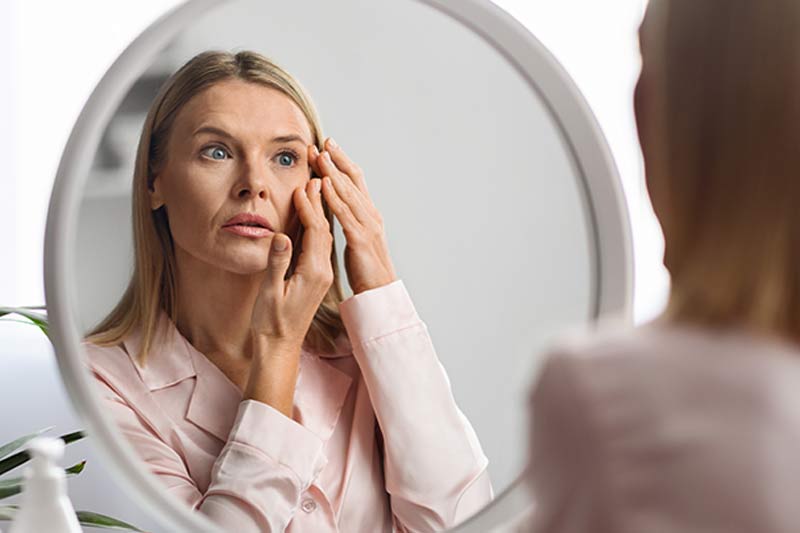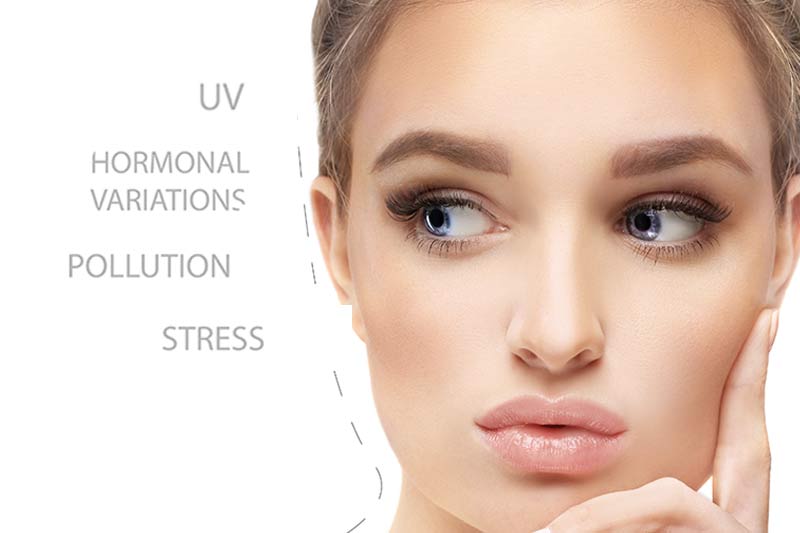Free radicals are highly reactive molecules that cause oxidative stress, one of the reasons for skin aging, wrinkles, and dark spots. Understanding how to reduce oxidative stress and minimize the damage from these harmful agents is vital. Proper skincare habits help boost skin’s resilience, neutralize damage, and maintain a youthful appearance.
This article explains how free radicals impact skin quality and what you can do to preserve skin health.

What Are Free Radicals?
Free radicals are unstable atoms or molecules that have unpaired electrons, making them unstable and highly chemically reactive with other substances. In an attempt to stabilize, they “steal” electrons from other molecules, creating oxidative stress that damages DNA, breaks down cell tissue, increases inflammation, accelerates aging, and contributes to chronic diseases (e.g., asthma, diabetes, dementia) or serious illnesses (e.g., cancer).
Free radicals are products of normal metabolic processes, but they also come from external sources (e.g., UV radiation, pollution).
Note: Learn how to reduce inflammation and alleviate the symptoms.
Examples of Free Radicals
Several types of free radicals reduce skin quality. They differ in terms of:
- Origin - They may be endogenous (caused by normal cellular metabolism) or exogenous (derived from external sources). External sources include UV radiation, air pollution, pesticides, smoking, alcohol, and fried foods.
- Reactivity - Some free radicals are highly unstable and more chemically reactive than others, causing greater damage to skin cells (e.g., hydroxyl radicals).
- Chemical formula – Free radicals are a subset of either ROS (reactive oxygen species) or RNS (reactive nitrogen species), two types of reactive molecules that contribute to oxidative stress by causing damage to DNA, RNA, and proteins.
Below are the most common free radicals that can lead to age-related skin issues.
Superoxide radicals (O2•−)
This primary oxygen radical may cause cell death by altering the mitochondrial membrane. This highly reactive radical damages skin cells by triggering lipid peroxidation, an oxidative chain reaction that affects DNA, cell membrane lipids, and proteins.
Hydroxyl radicals (⋅OH)
These highly reactive radicals attack cell membranes, causing severe oxidative damage to skin lipids, proteins, and DNA. They form from ·O2– and H2O2 in the presence of metal ions (e.g., copper, iron) and are highly cytotoxic, causing cell death or damage.
Nitric oxide (•NO)
Nitric oxide (nitrogen oxide or nitrogen monoxide) is a vascular signaling molecule involved in many inflammatory processes that may worsen skin conditions such as psoriasis. It reacts with superoxide radicals, producing peroxynitrite, a powerful oxidant that damages tissue and triggers DNA breakage.
How Do Free Radicals Damage the Skin?
Antioxidants neutralize free radicals in our body, keeping the skin healthy, firm, and resilient. If there is an imbalance, free radicals spread unchecked and damage cell membranes in a process known as oxidative stress.
Free radicals can damage the skin in the following ways:
- Premature aging (e.g., wrinkles, lines, creases)
- Loss of elasticity
- Skin inflammation
- Discoloration (e.g., dark spots, age spots)
- Increased sensitivity (e.g., photosensitivity)
- Impaired wound healing
- Collagen deficiency
- Loss of elastin
- Compromised skin barrier
- DNA damage
- Increased risk of skin cancer
How To Protect Skin from Free Radicals

Proper skincare routine, products, and lifestyle changes can protect your skin from free radicals. A few simple solutions can significantly reduce oxidative damage that leads to premature aging.
Adopt an Antioxidant-Rich Diet
Antioxidants help neutralize free radicals by giving up one of their electrons. These “free radical scavengers” help break a chain reaction that leads to oxidation and skin damage.
An antioxidant-packed diet boosts cellular defense and help preserve the skin’s protective barrier. The most potent antioxidants are found in berries, dark leafy greens, dark chocolate, nuts and seeds, figs, tomatoes, liver, and raw garlic.
Use Anti-Inflammatory Supplements
Dietary supplements improve skin health by calming inflammation and reducing oxidative stress. Anti-inflammatory compounds help accelerate the skin’s natural healing properties and lead to faster recovery.
Osmosis MD Regenerate supplements contain a potent mix of bioavailable antioxidants (e.g., glutathione), fat-soluble vitamins (e.g., vitamin D), amino acids, and minerals (e.g., selenium and copper). This supplement is recommended for aging skin, liver spots, and hyperpigmentation.
Sunisdin supplement contains beta carotene, which enhances the skin’s antioxidant defense, reduces oxidative stress, and protects against photoaging. Its advanced formula contains vitamins, antioxidants, and carotenoids essential for elastic, radiant skin.
Incorporate Antioxidant and Anti-Inflammatory Skincare
Antioxidant skin care helps repair skin cell damage, stimulates collagen and elastin, and delays wrinkle formation. Nutrient-dense skincare products also help reduce hyperpigmentation, increase cell turnover, and rejuvenate the skin.
Anti-inflammatory skin care helps reduce skin sensitivity and alleviate the symptoms of conditions such as rosacea, acne, or psoriasis. Anti-inflammatory products usually contain essential vitamins, minerals, and nutrients with potent wound-healing properties and the capacity to fight off free radicals.
Apply Anti-Pollution Skincare
Environmental factors have a severe skin-damaging effect, leading to collagen depletion, irritation, and premature aging. Anti-pollution skincare helps to neutralize external contamination, protect against toxic substances, and reduce the effects of skin pollution.
These products contain calming plant extracts, activated charcoal, antioxidants (e.g., resveratrol), AHAs and BHAs, and mineral UV blockers. This combination of ingredients provides thorough cleansing, toxin removal, and anti-inflammatory protection from harmful agents, such as free radicals.
Use Sunscreen Protection
When the sun’s ultraviolet (UV) rays interact with atomic oxygen, they initiate the formation of free radicals. These free radicals trigger oxidative stress, which leads to photodamage or photoaging of the skin.
UV radiation also increases skin sensitivity, speeds up aging, and causes premature wrinkles and creases. Prolonged sun exposure leads to DNA breakage, uneven pigmentation, and reduced collagen and elastin production.
Sunscreen products protect the skin by deflecting or absorbing harmful UV rays. Dermatologists recommend using mineral-based, broad-spectrum sunscreen protection with an SPF of at least 30 during the summer.
Note: Find out how to choose sunscreen to protect your skin and read about the 8 best sunscreen products that minimize photodamage.
Boost Protection with Facial Treatments
Regular facial treatments are a great way to detoxify your skin, reduce inflammation, and stimulate collagen production. These treatments usually incorporate antioxidant-rich serums and face masks packed with nutrients that nourish and protect all skin layers.
Facials enable the faster absorption of anti-inflammatory skincare products, which reduce oxidative stress and make skin more resilient. They also support the skin’s immune system, reverse some of the damage, and speed up recovery.
Some patients prefer a holistic facial because it enhances the experience with a breathwork session, essential oils, and a deeply relaxing face massage.
Drink More Water
Water helps to flush out toxins and remove accumulated waste, improving skin’s elasticity and resilience. Dry, dehydrated skin is more intolerant to outside agents that damage its protective barrier.
Drinking herbal tea helps to increase your daily hydration, providing more antioxidants and polyphenols that combat free radicals. This will allow your compromised skin to heal faster, strengthen the barrier function, and become less susceptible to environmental stressors.
Conclusion
Free radicals are the unavoidable products of modern life, natural metabolic processes, and aging. However, they are easily remediated with proper skincare solutions. Learning how to maximize your skin’s natural protective capacity to prevent unwanted damage is paramount. Maintaining healthy, radiant skin is easy when you combine the tips this article suggests.
Learn more about how to keep your skin healthy by contacting our Vibrant Skin Bar skin experts.


